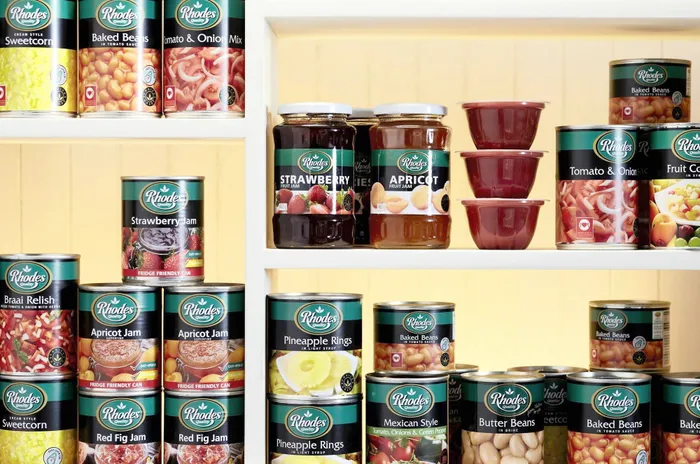RFG Holdings reports 9.7% decline in headline earnings amid rising US tariffs
FOOD MANUFACTURING

Some of RFG Holdings' key brands are photographed above. A proposal for it to be acquired by Premier Foods through a share swap.agreement is scheduled to be voted on by RFG's shareholders on December 11, 2025..
Image: Simphiwe Mbokazi/African News Agency (ANA)
RFG Holdings, the JSE-listed food manufacturing company said headline earnings fell 9.7% to R521 million in the year to September 28 while contingency plans were being adopted to counter higher US tariffs.
Group revenue for the company, which is in the process of being acquired by Premier Group in a share swap deal, increased by 1.6% to R8.1 billion, with regional revenue up 4.1% to R6.6bn. The total dividend fell 10.4% to 99.6 cents a share.
RFG management said the impact of the increased tariffs on South African exports to the US remained uncertain. However, the higher tariffs had reduced RFG's price competitiveness, and some existing customers were sourcing from producers in countries with a tariff advantage relative to South Africa.
“In response to the risk to sales, the group is implementing contingency plans to increase exports into other existing geographies and to pursue new market opportunities,” management said.
After rising 14.5% in the six months to March 2025, volumes fell by 1.9% in the second six months, to end the year, 6.6% higher.
In line with a strategy to focus on growth categories, dry foods and fruit juice, these continued to deliver strong volume and revenue growth.
The long-life foods performance was negatively impacted by pressure on canned meat volumes due to high input costs and consumer pushback on higher prices.
Directors said the regional environment saw constrained consumer spending and continued weak sentiment - regional revenue accounts for 81% of group revenue.
Revenue in the international segment was impacted by the global oversupply of deciduous fruit products, resulting in weaker demand. This was compounded by the uncertainty on trade tariffs affecting shipments to customers in the US.
Fresh foods revenue increased by 7.4%, with price inflation of 5.5% and mix changes of 2.4%, while volumes declined by 0.5%.
Ready meals reported good revenue and volume growth. Long-life foods increased revenue by 2.1% as volumes slowed in the second half.
Management reported market share gains.
RFG's brands are market leaders in canned meat (Bull Brand), canned tomato (Rhodes), frozen pies (Today and Mama's), and puff pastry (Today). The Rhodes brand claims the number two position in fruit juice, nectar, canned fruit, jam, canned vegetables, and infant meals, while Hinds is the number two brand in spices, herbs, and peppers.
International revenue declined 7.9% due to slower global demand arising from an oversupply of deciduous fruit products. Export volumes were down 3.7% in the second half, closing the year 6.8% lower.
A R104m impairment against the meat products operation was due to slower demand and lower margins. This resulted in the regional operating profit margin declining to 8.9% from 10.6%.
Excluding the impairment loss, regional operating profit increased by 2.4% to R691m, and the operating margin declined only marginally to 10.4% (10.6%). The international operating profit margin reduced from 11.4% to 5.7%.
Earnings before interest, tax, depreciation, and amortisation (EBITDA) was 12.7% lower at R1bn. Profit for the year decreased by 21.3% to R445m.
The transaction with Premier was still subject to approval by RFG shareholders in a general meeting scheduled for December 11, 2025, and approval from regulatory and competition authorities.
“While consumers remain under pressure, South Africa's improving macroeconomic outlook with lower interest rates, sustained low inflation, and expectations of improved economic growth should support modest growth in consumer spending and sentiment in the short to medium term,” RFG’s directors said.
BUSINESS REPORT